| Srl | Item |
| 1 |
ID:
176275
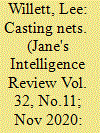

|
|
|
| 2 |
ID:
148922
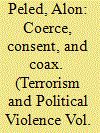

|
|
|
|
|
| Summary/Abstract |
Government Accountability Office reports and secondary sources reveal that the U.S. Congress has employed three distinct legislative approaches to address the federal counterterrorism information-sharing impasse: coerce, consent, and coax. One main example illustrates each approach: the Homeland Security Information Network project exemplifies the coerce approach; Intellipedia illustrates the consent approach; the office of the Program Manager of the Information Sharing Environment exemplifies the coax approach. Secondary examples are utilized including those of regional Fusion Centers, the Office of the Director of National Intelligence, and the National Counterterrorism Center. The merits and challenges of the three approaches are discussed and compared. The conclusion proposes ideas for using the approach most appropriate to specific counterterrorism challenges.
|
|
|
|
|
|
|
|
|
|
|
|
|
|
|
|
| 3 |
ID:
140274


|
|
|
|
|
| Summary/Abstract |
Information Sharing and Maritime Domain Awareness (MDA) are at the heart of the contemporary maritime security agenda. The goal of MDA is to develop shared understandings of developments and threats at sea. It is one of the preconditions for coordination and cooperation between diverse maritime security agencies and has often been understood as “key enabler”. MDA is a major technical challenge in terms of collecting and fusing data and developing expert systems for the detection of anomalies. It is also a social, political and legal challenge. This study focuses on the latter. It asks how MDA can be organized and how the socio-political challenges can be addressed. The organization of MDA in Southeast Asia is discussed in-depth, with a focus on three major centres that are the backbone of the regional MDA structure. Although far from perfect, this regional system has become a role model for organizing MDA in other parts of the world. This article explores the functions that the three centres perform in the governance of maritime security in the region. I argue that each of the MDA centres has different strengths, and that their work should be seen as complimentary in an overarching system. The strength of the overall system is in enabling trust and being flexible and adaptable to the changing situation at sea. The conclusion outlines what lessons the system holds for the organization of MDA in other regions with a focus on the Western Indian Ocean.
|
|
|
|
|
|
|
|
|
|
|
|
|
|
|
|
| 4 |
ID:
169351
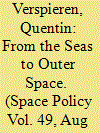

|
|
|
|
|
| Summary/Abstract |
Data collection and information sharing are at the core of any traffic control system. In particular, Maritime Situational Awareness—restricted in this article to one of its main components, the automatic identification system (AIS)—and Space Situational Awareness (SSA) are the backbones of, respectively, maritime and space traffic control frameworks. While the AIS has been initiated by civil authorities for civil purposes and is now being adopted by navies around the world, SSA, originally developed by the military to protect national security assets in outer space is progressively transferred to civil actors. This article shows how and why the intrinsically different nature and history of maritime and space traffics generated a totally reverse approach towards information and responsibility sharing in support to traffic control, while presenting current proposals for the evolution of SSA.
|
|
|
|
|
|
|
|
|
|
|
|
|
|
|
|
| 5 |
ID:
125670
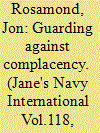

|
|
|
|
|
| Publication |
2013.
|
| Summary/Abstract |
Operation 'Atlanta' has been central to reducing piracy off the horn of Africa. However with the fishing vessel and 50 seafarers still held, the EUNAVFOR commander has warned that attacks could rise again without continued vigilance.
|
|
|
|
|
|
|
|
|
|
|
|
|
|
|
|
| 6 |
ID:
134052
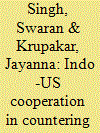

|
|
|
|
|
| Publication |
2014.
|
| Summary/Abstract |
The increasing dependence on Information and Communication Technologies (ICTs) has unleashed a whole new genre of cyber terrorism. Cyber attacks on critical infrastructure, online hate propaganda and use of the internet for recruiting, planning and effecting terrorist attacks have become new frontiers of terrorism. The ubiquitous cyberspace has expanded terrorism structures and transformed their operations. Given their democratic traditions of privileging basic freedoms, such as individual privacy, and the unprecedented spread of the internet, India and the US face a formidable challenge in confronting cyber terrorism. While both countries share a strong political affinity to cooperate and have set up institutional mechanisms to secure cyberspace, divergences in their approaches and a lack of clarity and consensus on their immediate and long-term goals continue to be their fundamental limitations. In spite of their strong commitment to work together, their divergent approaches to internet governance and episodes like the WikiLeaks and Snowden affairs have only re-enforced their continuing trust deficit.
|
|
|
|
|
|
|
|
|
|
|
|
|
|
|
|
| 7 |
ID:
089303


|
|
|
| 8 |
ID:
089622


|
|
|
|
|
| Publication |
2009.
|
| Summary/Abstract |
There is a public interest in ensuring that infrastructure systems are appropriately protected and prepared for disruptions. While infrastructure protection is usually viewed as a public responsibility, infrastructure risk management actually requires a high degree of cooperation between the public and private sectors, particularly in the sharing of information about risks to infrastructure. Discussions with Chief Security Officers across sectors of the US economy reveal the complexity of the task, as they describe at length the private sector's requirements of multiples types of information about a range of potential threats. While the US government has established many mechanisms for sharing information, barriers remain that inhibit both the private and public partners from obtaining the information needed to protect infrastructure. Overcoming these barriers requires new thinking about the intelligence generation process, the mechanisms and practices upon which the process relies, and the responsibilities of those in the private sector who participate in it.
|
|
|
|
|
|
|
|
|
|
|
|
|
|
|
|
| 9 |
ID:
126687
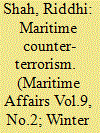

|
|
|
|
|
| Publication |
2013.
|
| Summary/Abstract |
Centre-state relations in India are a fascinating area of studies. The structure of the relationship has an effect on every single aspect of life as we know it in India. This paper is an attempt to study centre-state relations in the context of India's maritime counter-terrorism strategy. Although the Government of India has not publicly stated its counter-terrorism strategy on the sea, intelligence, information sharing, crisis response, finances for internal security and the nation's legislation for battling terrorism together comprise India's maritime-terrorism strategy. Through study of these areas, the paper argues that the centre-state divide has had systemic implications on India's maritime security and has largely done more harm than good to collective initiatives that aspire to prevent future risk of terrorism from the sea or on the sea.
|
|
|
|
|
|
|
|
|
|
|
|
|
|
|
|
| 10 |
ID:
129658
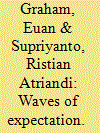

|
|
|
| 11 |
ID:
100615
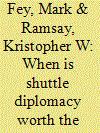

|
|
|
|
|
| Publication |
2010.
|
| Summary/Abstract |
The authors study the conflict mediation problem, sometimes called "shuttle diplomacy," when the mediator acts as a go-between and must gather information from the disputants. In the context of a general model of information mediation, they show that the incentive that disputants have to lie to the mediator undoes any advantage that might be gained by adding communication with a third party. In fact, the main result shows that any equilibrium outcome that is achievable through mediation is also achievable as an equilibrium outcome of a game with unmediated preplay communication. This is true even when the mediator is allowed to have arbitrary preferences or biases. The authors then test their empirical prediction on dispute management efforts between 1937 and 1985. The analysis supports the hypothesis that information mediation has no effect in environments where the mediator has no independent source of information.
|
|
|
|
|
|
|
|
|
|
|
|
|
|
|
|